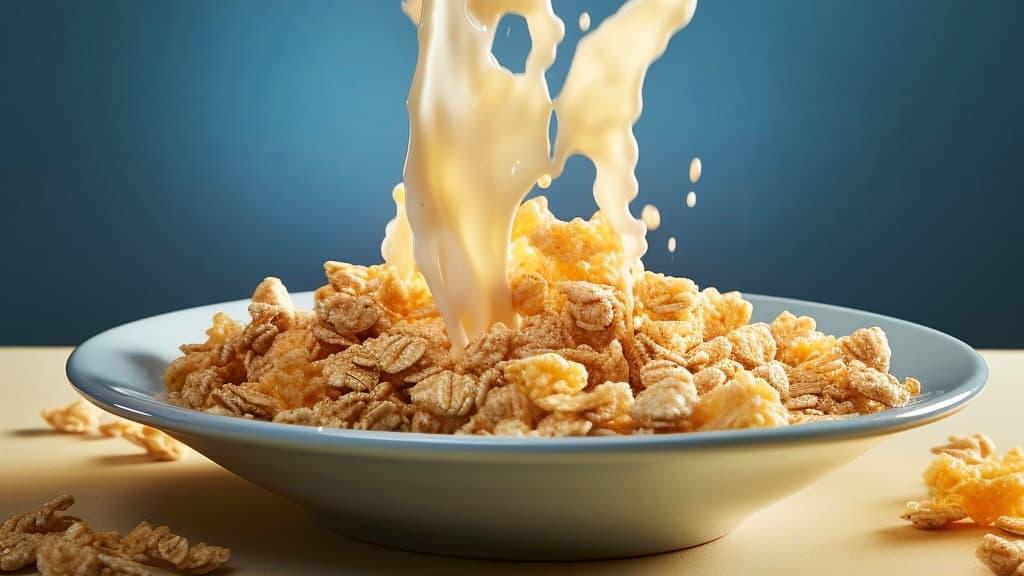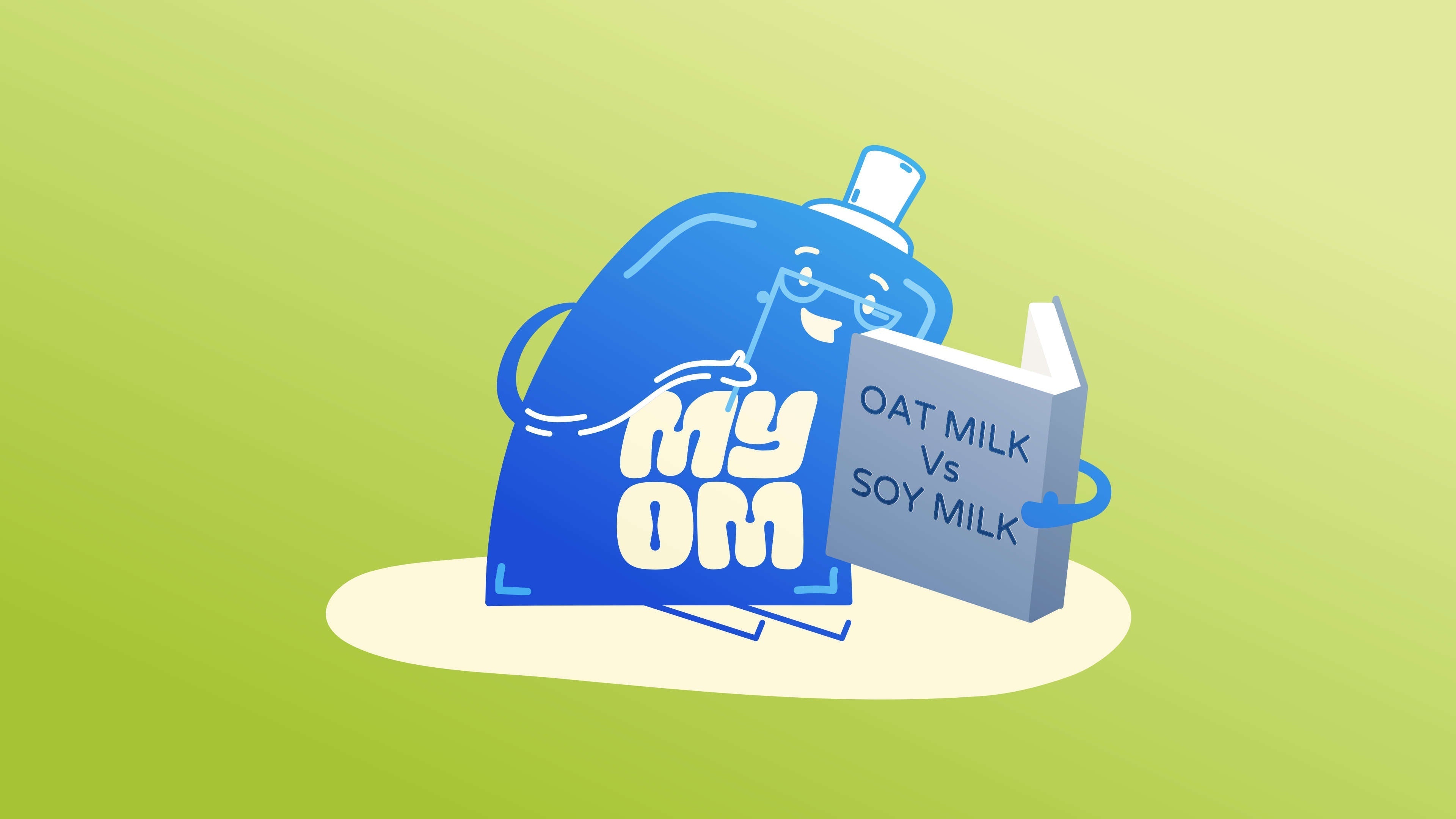What is Plant Milk?
With the growing shift away from dairy, more cereal lovers are searching for the best plant milk for cereal. But not all milks are equal when it comes to taste, texture, and nutrition. The best options mimic the creaminess of cow’s milk alongside health and environmental benefits.
Oat milk tops the list as the most popular dairy-free option, swirling into cereal with a frothy texture and mild flavour. Even better, you can make fresh oat milk at home in minutes using an innovative new premix called MYOM that removes the water weight of carton-based oat milk brands. Alongside oat milk, soy milk brings protein to the table with a naturally sweet taste, while rice milk provides an ultra-light body and subtle flavour for those sensitive to nuts and gluten. For bolder cereal flavour, almond milk adds a toasted nuttiness while coconut milk lends tropical flair.
As plant-based lifestyles move mainstream, the options now available can please any palate while benefiting health and sustainability. The key is choosing milks with positive impacts across flavour, nutritional and environmental measures.
Benefits of Plant Milk
Full of important nutrients, lots of plant-based milks have extra vitamins like B12 and D along with minerals such as calcium added in. They usually have fewer calories and low or no cholesterol, which makes them good for your heart.
But while plant-based milks are often assumed to be eco-friendly alternatives to dairy, not all options measure up in terms of sustainability. Many mainstream brands of almond and coconut milks available at the grocery store have sizable carbon footprints due to large water usage, pesticides, and significant greenhouse gas emissions from farming, processing, and cross-country transportation.
Specifically, conventional almond milk production tends to use substantial amounts of water in drought-prone climates like California. And while coconuts grow easily in tropical locales, the emissions associated with shipping coconut milk long distances to Western markets can outweigh the environmental benefits. Even with oat milk, transporting large volumes of what’s mostly water in cartons wastes energy. 80% of the plant-based milk sold in the UK is imported from the EU or US.
One solution lies in reimagining our relationship with plant-based milks. MYOM has developed a new food technology to distribute oat milk as an at-home premix empowering people to make their own fresh oat milk, avoiding transport miles and packaging waste. As with all our food choices, being informed about the environmental impacts behind every sip of plant milk can make all the difference.
When we talk about breakfast cereal, plant milk is the best at being flexible. Each kind, from almond to soy to oat milk is different. They change a basic breakfast bowl of cereal into something fun. Some, like almond milk, are light and have a nice nutty flavour. They go well with granola in the morning to add some crunch. They add a hint of sweet taste and make it richer than before.

Types of Plant-Based Milk
When buying your plant-based milk, it’s a good idea to consider the types of plant-based milks available. There are so many out there, made from nuts, grains, or legumes – it’s best to do some experimenting to find the perfect match for your favourite morning cereal.
Oat Milk
Oat milk, a recent but mighty contender in the plant-based milk arena, has quickly gained popularity for its array of uses and health benefits. Its suitability for both coffee and cereal are unparalleled; it blends perfectly with the bitterness of coffee and complements the textures of various cereals. The creamy taste of oat milk, along with its added fibre content, makes it a nutritious and satisfying choice for any meal or beverage.
When it comes to flavour and texture, oat milk stands out with its naturally sweet and mild profile. It’s creamier and thicker than many of its counterparts like almond milk, which tends to be lighter and nuttier, or flax milk, known for its slightly grassier taste. This rich texture makes oat milk a preferred option for those seeking a closer dairy-like experience in their plant-based alternatives.
Enter MYOM, a first-of-its-kind oat milk premix that allows you to make fresh, homemade oat milk in seconds. Rather than buying oat-flavoured water shipped in cartons from factories, MYOM removes the water from the equation. You add your water at home or when it is convenient for you to make rich, creamy oat milk.
The difference this makes is significant. By keeping the water weight down, each packet of MYOM allows for 10 times more fresh oat milk output compared to an equal amount of pre-made oat milk by volume. This drastically cuts emissions from transport and packaging while saving you money.
More importantly, MYOM puts the power of making superior plant milk back in your hands. You can customise the thickness, flavour, and nutrition to suit your needs - no more compromise between taste, health, and sustainability.
Rice Milk
Picture a gentle, sweet alternative in the plant milk family, and you’ll likely land on rice milk. Unsweetened rice milk in a standard cup brims with a unique nutritional profile: it’s typically low in protein but makes up for it with a higher calorie and carb profile, offering a quick energy boost. It’s a bit like the quiet contender in the race, often fortified with essential nutrients like calcium and vitamin B12 to round out its benefits.
Rice milk is subtly sweet providing a smoother, more fluid consistency. When you compare it to its plant-based siblings, like almond or oat milk, rice milk stands out for its lightness and mild flavour. It’s not as creamy or heavy as some of its counterparts, making it a lighter choice for cereals.
Cashew Milk
Cashew milk has this creamy texture and a sweet, understated flavour. It’s not the protein powerhouse that some other plant milks are, but it’s rich in vitamins and minerals, making it a nutritious choice nonetheless.
When it comes to making cashew milk, there’s a bit of a process involved. Cashews are soaked until they’re just plump enough, and then blended into this smooth, creamy liquid. It’s a straightforward process, but the result is anything but plain. This simplicity lets the natural, mildly sweet taste of cashews take centre stage.
The cashew milk doesn’t try to be the star of the show when used in cereal. Instead, it gently complements the flavours of your cereal, adding a touch of creaminess and sweetness without overwhelming.
Coconut Milk
The richness of coconut milk is both its charm and its challenge. It’s got a higher fat content, which blesses it with that creamy, indulgent texture we all love. This means it’s fabulous in cooking – think of it bringing a touch of tropical luxury to your curries or giving your morning smoothie a creamy twist. But, if you’re keeping an eye on your calorie intake, it’s worth remembering that this richness comes with a few extra calories, so it might not be ideal for breakfast every morning.
Environmentally speaking, coconut milk’s story is a mixed bag. On one hand, coconut farming can be sustainable, but it’s not without its hitches, like concerns over deforestation and the welfare of those who toil in the coconut groves. The trick is to choose coconut milk from sources that are upfront about their farming and production practices.
Almond Milk
Almond milk has become something of a poster child for plant-based milks, but it’s a bit of a mixed bag when you look closer. On the health front, it’s a great choice – low in calories, high in vitamins and minerals, and, of course, dairy-free. It’s especially popular for its light, nutty flavour that doesn’t overwhelm other tastes in your cereal or coffee.
However, there are some environmental concerns to keep in mind. Almond farming is incredibly thirsty work; these little nuts require a lot of water to grow, which can be a significant issue in areas like California, a major almond producer. Then there’s the bee factor. Almonds need bees for pollination, and the high demand for almonds means a lot of bees are transported across the country to almond farms. This can be stressful and harmful for the bees.
For those with nut allergies or concerns about these environmental issues, there are plenty better alternatives. Additionally, if you’re opting for sweetened almond milk, watch out for additives like carrageenan, which can cause digestive issues for some people. It’s always a good idea to check the label and choose the version that best suits your dietary needs and environmental concerns.
Macadamia Milk
Macadamia milk might not be the first thing you think of when exploring plant-based milks, but it’s a hidden gem with plenty to offer. Known for its rich and creamy flavour, it’s quickly becoming a favourite for those seeking a luxurious twist in their morning cereal. It’s not just about taste, though; macadamia milk is packed with nutritional value. It stands out as a sustainable choice in the plant milk world, with macadamia trees being relatively low maintenance and hardy.
It’s a naturally low-calorie alternative to cow’s milk, making it a great choice for maintaining a balanced diet. Another major plus is its high levels of healthy monounsaturated fats, which are known for their heart-healthy properties. These fats can help in reducing cholesterol levels and managing blood pressure, contributing to overall cardiovascular health.
Hazelnut Milk
Hazelnut milk is an intriguing option in the ever-expanding universe of plant-based milks. With its distinctly nutty flavour and surprisingly low-calorie content, it offers a unique twist to your usual milk choice. It’s an attractive alternative for those seeking a different taste profile, especially for anyone fond of that classic hazelnut essence.
Hazelnut milk generally fares better than almond milk in terms of sustainability. Hazelnut trees don’t demand as much water as almonds, making them an eco-friendlier choice in terms of resource usage. This doesn’t mean hazelnut milk is without its drawbacks; as with any agricultural product, there are environmental impacts to consider, but it’s a step in the right direction.
Nutritionally, hazelnut milk stands out for its low protein content but high in fibre, which is great for digestive health. Though it might not be the first choice for people looking to increase their protein intake, this is a great way to add more fibre in your cereal.
Hemp Milk
Hemp milk might not be the first thing you reach for to pour on your breakfast cereal, but it’s important not to discount its qualities. Let’s talk about what’s in it: hemp milk is impressive with its high protein and low carb profile. It’s like the quiet achiever of the milk alternatives – not shouting about its benefits, but once you discover them, you’re hooked. Plus, it’s got this honest, straightforward appeal with no added sugars or artificial sweeteners. You’re getting the real deal.
Vitamin-wise, hemp milk is like a mini-multivitamin. It’s got vitamin A, iron, and a nice bit of fibre. But here’s the catch – it doesn’t usually come with added extras like calcium or vitamin D, which are often fortified in other plant milks.
Finding hemp milk can sometimes feel like a mini treasure hunt – it’s not always on the shelves, and when it is, it might cost a bit more than your regular almond or soy milk. This is partly because hemp isn’t as widely produced – it’s still making a name for itself in the milk alternative market. But it’s good news for anyone with nut or dairy allergies: hemp milk is a fantastic option.
Pea Milk
This newcomer to the plant milk scene is turning heads for all the right reasons. Firstly, its nutritional profile is impressive: pea milk is a bit of a protein powerhouse, rivalling even cow’s milk in this regard. It’s also rich in calcium, making it a strong contender for those looking to boost their bone health. Plus, it’s free from dairy, nuts, and soy, which is great news for anyone with allergies or dietary restrictions.
If you’re expecting it to taste like liquid peas, you’re in for a surprise. It’s actually quite creamy and has a more neutral flavour than you might expect, making it a versatile choice for your cereal, coffee, or smoothies. Environmentally speaking, pea milk is a bit of a superhero. Compared to some other plant-based milks, its production is less resource-intensive.
Getting The Very Best Breakfast Experience With MYOM
With a wide range of flavours and textures, the best plant milk for cereal is a personal choice. If you’re selecting plant-based milk for ease of purchase though, you can’t beat MYOM which is delivered to your door in letterbox-friendly, recyclable, multipacks.
If you’re approaching it from an environmental point of view, then it’s also important to do your homework and ensure that the plant milks you buy are truly sustainable. This is where MYOM can help – our Original Oat Drink Blend is the perfect plant-based milk to help you start your mornings right. We keep sustainability a top priority, from transport to water usage and beyond. Try it now and revolutionise your mornings.





